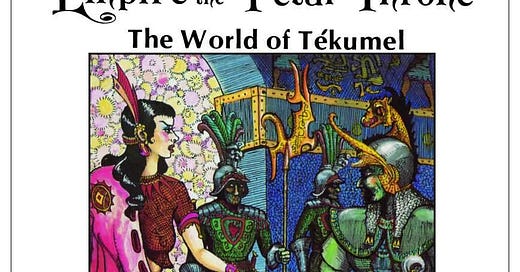This is not the article I intended to write. This was supposed to be a post about “The King of the Swords” by Michael Moorcock. But the best-laid plans are sometimes interrupted by events that are more important, and/or (regrettably, in this case) more timely. I will post the intended article next week.
A week ago last Thursday, an alert for the following thread appeared in my Reddit feed:
M.A.R. Barker, creator of Tékumel and Empire of the Petal Throne, wrote a neo-nazi novel in 1991.
I spent much of this past weekend reading through that discussion, as well as similar conversations on ENWorld, RPG.net, and Dragonsfoot.
Empire of the Petal Throne (EPT), created by M.A.R. Barker (who died in 2012), was an impressive achievement in the early days of role playing games. The first complete setting published for such a game, it offered players an intricate, immersive world to explore.
EPT is not, of course, B/X Dungeons & Dragons. It proceeded Moldvay’s version of the Basic rules by six or seven years. Technically, it’s not Dungeons & Dragons at all, although the original version of D&D forms the basis for the EPT rules published by TSR Hobbies, Inc. (TSR) in 1975.
Still, EPT had a place in my imagination as an 11-year-old learning Basic D&D. It appeared in TSR product lists, along with a description of Barker’s world of Tékumel, conveying the exotic nature of its setting (science fantasy, an element of early D&D excluded from my Basic rules), the non-Western inspirations for its human civilizations, and the depth of its world-building. Like J.R.R Tolkien, Barker was a linguist, and invented languages specifically for his setting—particularly Tsolyani, “inspired by Urdu, Pashtun, and Mayan.”
He was also, we now know, a Nazi sympathizer.
In 1991, using a pseudonym, Barker released the novel Serpent’s Walk. The back cover describes the story:
“The good guys win sometimes.
Not always, of course. They lost big in the Second World War. That war was a victory for communists, democrats, and Jews, but everyone else lost…
Hitler’s warrior elite—the S.S.—didn’t give up their struggle for a White world when they lost the Second World War…Instead their survivors went underground…
A century after the war, they are ready to challenge the democrats and Jews for the hearts and minds of White Americans…”
Spoiler—at the end of this conflict, Barker’s “good guys” win.
The novel remains available from its publisher, the National Alliance, “for decades the most dangerous and best organized neo-Nazi formation in America.”
In addition to writing Serpent’s Walk, Barker also served, from 1989 to 2002, on the Editorial Advisory Board of The Historical Review, a now-defunct Holocaust denial publication.
These are not conjectures. The Tékumel Foundation—entrusted with stewardship of the setting since Barker’s death—has confirmed both his authorship of Serpent’s Walk, and his involvement with The Journal of Historical Review. Regrettably, it seems they may have chosen to do so a decade after their archivist told them about the novel, and only after the details became public in an online forum.
Reactions within the D&D community have been what you might expect: feelings of betrayal, and confliction, as well as a grim outlook for the future of the Tékumel setting. Regrettably (though not surprisingly) there are also a few (highly unconvincing) attempts at apologizing for Barker. I won’t link to them in this article1.
Two elements of the discussion surrounding this revelation have been most disturbing to me.
The first element is the question of how much Nazi philosophy Barker included (consciously or unconsciously) in his world of Tékumel. Like many, my gut reaction was “not much”, but a weekend’s reading on game forums quickly revealed a number of red flags:
The Pygmy Folk are reminiscent of historical anti-Semitic tropes. Plus, they’re called the “Pygmy” Folk.
The world of Tékumel contains a several different intelligent species, who for the most part, live separately from one another. Barker would revisit the notion of the “ethnostate” in Serpent’s Walk.
The morality system in Tékumel defines "noble acts being in line with what authority prescribes/your place in society”.
The link in the final point includes a few additional insights along these lines.
The second element is the unsettling recurrence of fascist, or at least fascist-adjacent, tropes in fantasy and science fiction, as well as the enthusiasm with which fascists embrace these tropes. In short, fascists love to construct the fantasy of a “golden age” of racial purity/social hierarchy, to which society can return only by adopting the tenants of—you guessed it—fascism! Even non-fascist works are subject to being abused in this way. Norman Spinrad included the final section of The Iron Dream specifically for fans of Nazism who refuse to understand the novel is satire.
I’m not certain what to do with these realities. Nazis ruin everything.
Going forward, I’m sure I will read my copy of EPT with a much more critical eye—but do I want to use it in play? At the very least, it should come with a warning label, so players know the potential subtext, and the history behind it. I certainly would not want to referee a group of villainous characters in a pseudo-fascist setting, unless we agreed they were villains in search of redemption. Enthusiasm for fascism, and even proto-fascist heads-of-state, are all-too prevalent in the real world. My soul can’t handle exploring fascism in a game of escapist fantasy, unless it’s portrayed in the wholly negative light it deserves.
In addition, I’ll give thought to the close association between fascism and fantasy. I love fantasy gaming, but it’s fantasy—I don’t know that it so frequently needs to be tied to a few specific historical systems of government (e.g. absolute monarchy, or oppressive oligarchy). Even if I do want historical precedence, forms of democratic and republican government date back to Greece and Rome, respectively.
The truth is, government of any form plays a diminished role on the frontier, in the dungeon, and in small villages, where characters spend much of their time. Adventuring in a fantasy republic should be little different from adventuring in a fantasy monarchy, unless I’m running a highly political game—in which case a diversity of governing systems would only add to the depth of the setting.
Fantasy is often an escape, but at its best, it can help us interpret the real world. The revelations about M.A.R. Barker, and how his views may have influenced the setting he created, serve as a reminder that each of us is ultimately responsible for the interpretive filter we build through our hobbies and occupations. I’ll be working to make mine ever more helpful in understanding both the real and imagined worlds.
If you are someone who claims to believe Barker’s neo-Nazi novel and 13 year service on the board of a Holocaust denial publication were elaborate trolls by a genius who liked to prank people less intelligent than himself, please post such comments elsewhere. I will delete them here. This article is not the place to discuss desperate, and already-discredited, arguments against what are now firmly established facts.







Yeah, like I always appreciated the depth of the setting and that the author was clear and vocal about not just wanting to replicate modern sensibilities or, standard, European and medieval cultural tropes in the setting, but it still felt weird to me, (and this was way back in the late 90s/early 00s, before the same apologists jump on me to say I'm just jumping on the 'politically correct' bandwagon in gaming in the past few years.)
Honestly you don't need to change much, just have a bit of mindfulness, particularly with this new knowledge about the authors personal views.
I still love the Tekumel setting, but the insistence of the 'alternative morality' (fairly heirarchical, with people 'born to rule,' species outside of the humans seen as essential outsiders and with some tacit gender determinism) of the Empire of the Petal Throne never sat very well with me and I adopted a looser interpretation.
It can be salvaged, but there are some changes that need to be made to make it palatable. I am disappointed but not surprised that the author turned out to be an utter nazi. In a way it's refreshing, shows that, by comparison, Tolkien was never as bad as some folk make out! 😅